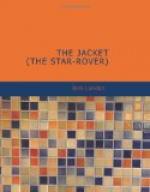There are numerous islands in the group, over all of which Raa Kook is king, although the cluster of islands to the south is restive and occasionally in revolt. These natives with whom I live are Polynesian, I know, because their hair is straight and black. Their skin is a sun-warm golden-brown. Their speech, which I speak uncommonly easy, is round and rich and musical, possessing a paucity of consonants, being composed principally of vowels. They love flowers, music, dancing, and games, and are childishly simple and happy in their amusements, though cruelly savage in their angers and wars.
I, Adam Strang, know my past, but do not seem to think much about it. I live in the present. I brood neither over past nor future. I am careless, improvident, uncautious, happy out of sheer well-being and overplus of physical energy. Fish, fruits, vegetables, and seaweed—a full stomach—and I am content. I am high in place with Raa Kook, than whom none is higher, not even Abba Taak, who is highest over the priest. No man dare lift hand or weapon to me. I am taboo—sacred as the sacred canoe-house under the floor of which repose the bones of heaven alone knows how many previous kings of Raa Kook’s line.
I know all about how I happened to be wrecked and be there alone of all my ship’s company—it was a great drowning and a great wind; but I do not moon over the catastrophe. When I think back at all, rather do I think far back to my childhood at the skirts of my milk-skinned, flaxen-haired, buxom English mother. It is a tiny village of a dozen straw-thatched cottages in which I lived. I hear again blackbirds and thrushes in the hedges, and see again bluebells spilling out from the oak woods and over the velvet turf like a creaming of blue water. And most of all I remember a great, hairy-fetlocked stallion, often led dancing, sidling, and nickering down the narrow street. I was frightened of the huge beast and always fled screaming to my mother, clutching her skirts and hiding in them wherever I might find her.
But enough. The childhood of Adam Strang is not what I set out to write.
I lived for several years on the islands which are nameless to me, and upon which I am confident I was the first white man. I was married to Lei-Lei, the king’s sister, who was a fraction over six feet and only by that fraction topped me. I was a splendid figure of a man, broad-shouldered, deep-chested, well-set-up. Women of any race, as you shall see, looked on me with a favouring eye. Under my arms, sun-shielded, my skin was milk-white as my mother’s. My eyes were blue. My moustache, beard and hair were that golden-yellow such as one sometimes sees in paintings of the northern sea-kings. Ay—I must have come of that old stock, long-settled in England, and, though born in a countryside cottage, the sea still ran so salt in my blood that I early found my way to ships to become a sea-cuny. That is what I was—neither officer nor gentleman, but sea-cuny, hard-worked, hard-bitten, hard-enduring.




